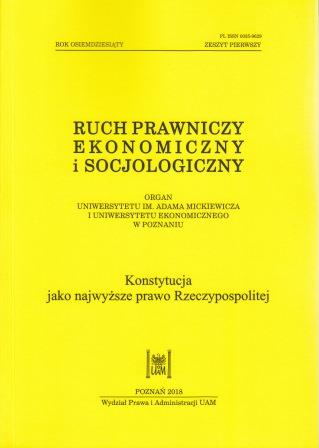GRANICE INTERPRETACJI ZASADY DEMOKRATYCZNEGO PAŃSTWA PRAWNEGO
LIMITS OF THE INTERPRETATION OF THE DEMOCRATIC RULE OF LAW PRINCIPLE
Author(s): Andrzej BałabanSubject(s): Constitutional Law, Sociology of Law, Court case
Published by: Uniwersytet Adama Mickiewicza
Keywords: limits of the interpretation; democratic rule of law; principle;
Summary/Abstract: Article 2 of the Constitution of the Republic of Poland contains a provision with an overwhelming normative potential, which was already known at the time of its introduction (29 December 1989) into the Constitution of the Polish People’s Republic and its continuation in an unchanged form in a newly adopted constitutional act on 2 April 1997. In 1989 it was supposed to become an ‘antidote’ to the doctrine of the ideologisation of the Constitution, replacing the rule that ‘The People’s Republic of Poland is a socialist state’ contained in Article 1 of the Constitution. In 1997, its revolutionary role was replaced by the role of the legal value, understood in two ways. Firstly, it was supposed to be the basis for a system of detailed principles, tools and guarantees necessary to build an efficient democratic and just state. Secondly, it was supposed to create a presumption of the dominance of such an idea and be a source of exponential interpretations that would supplement and improve the functioning of a new, classical formula of the state. The three-component constitutional formula of the rule of law, democracy and justice means the coupling of legal and axiological tools in defence of the state, nation and citizens (individuals). Its division into three separate elements (the rule of law, a democratic state, a just state), encountered in constitutional law textbooks, weakens this formula and also diminishes the importance of its three derivatives. The democratic and ‘justice’ element of this principle, if we are to seek its own separate, independent meanings, is developed in further principles and norms of the Constitution. An important question as to the scope of the effect of broad interpretations of the principle of a democratic rule of law is the search for interpretations that are erroneous and burdened with consequences. This group, I believe, includes the problem of the Constitutional Tribunal postponing the entry into force of decisions declaring the loss of validity of a binding normative act contrary to an act of higher legal force and the problem of the significance of the principle of budgetary equilibrium for the case-law of the Constitutional Tribunal.
Journal: Ruch Prawniczy, Ekonomiczny i Socjologiczny
- Issue Year: 80/2018
- Issue No: 1
- Page Range: 53-59
- Page Count: 8
- Language: Polish

